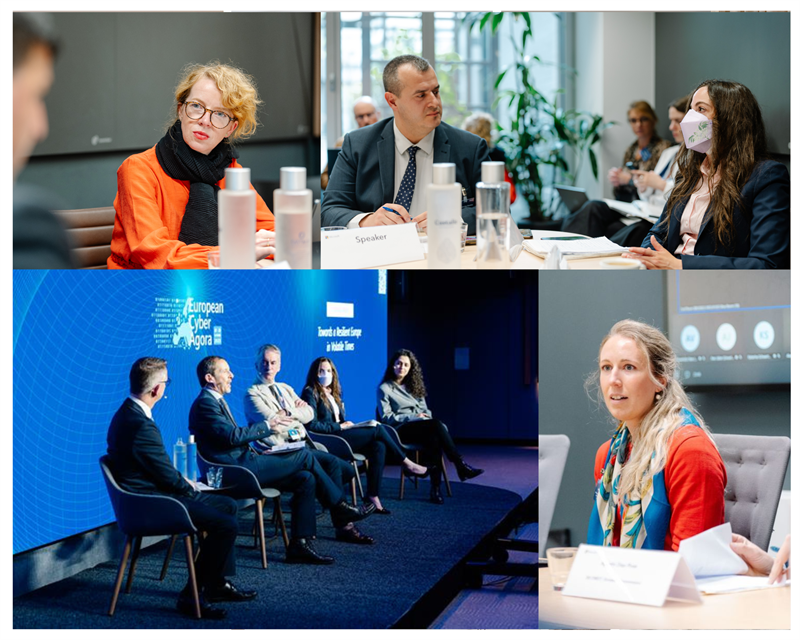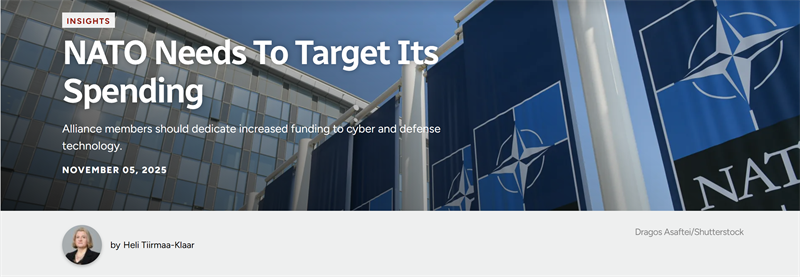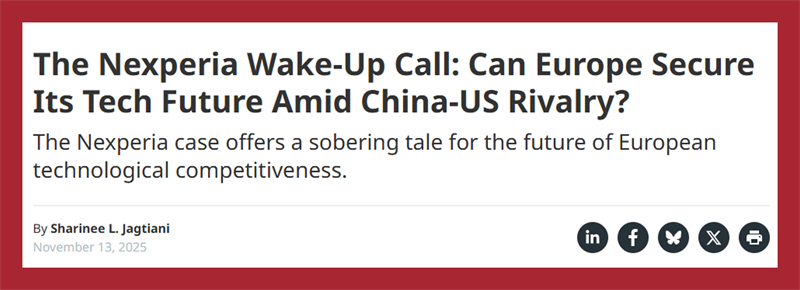TransatlanTech Insider—November 2025 Edition
Welcome to the November edition of the TransatlanTech Insider.
The rubber is hitting the road as Europe aims to chart its own course on a competitive digital future. This month, France and Germany co-hosted the European Summit on Digital Sovereignty in Berlin, where the two nations affirmed their commitment to a more technologically competitive Europe in data, digital markets, and frontier artificial intelligence (AI). They also launched a task force to define European digital sovereignty, with an aim to embed that definition into sectoral regulations. At the same time, the European Commission released its Digital Omnibus, designed to simplify key regulations. The package will delay enforcement of provisions of the EU’s AI Act regarding “high-risk AI” systems (comprising 18% of enterprise AI systems as of 2023) until late 2027. It also proposes amendments to the General Data Protection Regulation (GDPR) that aim to broaden the types of personal data for AI training without an individual’s affirmative consent.
The uncomfortable backdrop to the EU’s digital sovereignty push is power shifts in the relationship between the United States and the People’s Republic of China (PRC) following the recent meeting between Donald Trump and Xi Jinping. Beijing is now emboldened to throw its economic weight around globally, including in Europe. Nowhere are these dynamics playing out more acutely than in the case of the Dutch semiconductor firm Nexperia, which is owned by PRC-based Wingtech. To avoid a large-scale transfer of technical know-how and chip production to the PRC, the Dutch government seized control of the firm in September, then appeared to loosen its grip this month in a “show of goodwill”. The move came after Beijing placed export controls on the firm’s chips, squeezing automakers that rely on them for vehicle electrical systems.
In this edition, GMF Technology shares highlights from its 5th annual European Cyber Agora, reports on speaking engagements on AI and international standards, and offers recommendations for NATO cybersecurity priorities as the alliance strives to hit its new spending target. Subscribe to receive future newsletter editions, follow us on X, and visit our webpage to learn more.
Featured this Month

GMF Hosts 5th Annual European Cyber Agora
GMF Technology convened government officials, industry leaders, and technology policy shapers in Brussels on October 22-23 for cross-sectoral dialogues on European resilience in the age of AI. This year’s conference explored themes on AI and societal resilience, cyber accountability, and digital transformation for security and defense. Microsoft and EU Cyber Direct co-hosted the gathering.
GMF Technology experts led key events at the Agora.
- Lindsay Gorman spoke on the opening panel, “Toward a Resilient Europe in Volatile Times”, with Danish Minister for Resilience and Preparedness Torsten Schack Pedersen and NATO Acting Deputy Assistant Secretary General and Director of Strategy and Policy for the Cyber and Digital Transformation Division Marco Criscuolo. Discussing challenges and opportunities for transatlantic technology cooperation, Gorman highlighted the strategic opportunity for such collaboration on emerging technologies in the pre-competitive stage, particularly for quantum technologies.
- Lindsay Gorman spoke at the “Quantum, Cybersecurity and Europe’s Strategic Autonomy” workshop with Danish Tech Ambassador Anne Marie Engtoft Meldgaard and Vice President of the European Quantum Industry Consortium Freeke Heijman-te Paske. Gorman examined strategies to strengthen innovation ecosystems and safeguard intellectual property as strategic competition with the PRC intensifies.
- Deputy Managing Director and Senior Fellow Astrid Ziebarth hosted the “Skills for a Resilient Europe” workshop, leading a conversation that included European Commission Head of Unit for Digital Education Georgi Dimitrov and Microsoft Senior Manager for European Government Affairs Andreea Calbeaza. Discussants explored strategies to build a holistically skilled cyber workforce as Europe confronts a cybersecurity talent gap and AI-driven changes to the digital threat ecosystem.
- Program Manager and Fellow Julia Tréhu hosted the “Defending Europe's Subsea Cable Infrastructure” workshop, where she led a discussion that included European Commission Deputy Head of Unit for Future Connectivity Systems Agustin Díaz-Pinés and RAND Europe Senior Analyst Henri van Soest. Discussants explored mitigation strategies for subsea cable vulnerabilities and evaluated the EU's new action plan to safeguard these vital lifelines.
Visiting Distinguished Fellow Heli Tiirmaa-Klaar Offers Recommendations for NATO Defense Spending

In her latest piece, “NATO Needs to Target Its Spending”, Tiirmaa-Klaar analyzes the alliance’s pledge to spend 5% of GDP on defense by 2035 as Europe faces mounting hybrid threats. NATO’s target is laudatory, she writes, but allies must spend wisely to ensure the funds safeguard the alliance from acts of sabotage such as cyber disruptions, civilian-flight signal jamming, and drone incursions. Calling for targeted funding for cybersecurity, Tiirmaa-Klaar offers two key recommendations for the alliance: prioritize swift integration of defense technology innovation into NATO capabilities and bolster cyber and physical defenses for critical infrastructure.
Lindsay Gorman Speaks on the AI Stack and Deployment at US State Department Events in Geneva

Photo: US Mission to International Organizations, Geneva.
Gorman took part in the moderated discussion “Deploying AI: Growth, Innovation, and the U.S. AI Stack” in Geneva, organized by the city’s US Mission to International Organizations and hosted at the Giga Centre, home to the International Telecommunications Union (ITU) and UNICEF-led Giga Project. Speaking alongside Dell Technologies’ Vivek Mohindra and moderator Silvia Vacchi of the ITU, she discussed democratic approaches to AI innovation and adoption, responsible AI development, and the importance of purpose-built global partnerships. The event anchored Gorman’s wider engagement with the US mission, which also included conversations at CERN, the European Organization for Nuclear Research, and a discussion with ambassadors from the Group of 77 hosted by Chargé d'Affaires Tressa Rae Finerty.
Senior Officer Sharinee Jagtiani Analyzes Nexperia Standoff in The Diplomat Op-Ed

In her opinion piece, Jagtiani examines how recent developments concerning chipmaker Nexperia exposed the fragility of Europe’s technology ecosystem amid intensifying US–PRC competition. She traces the background to the Dutch government’s decision to seize the PRC-owned, Netherlands-based company and to Beijing’s retaliatory temporary export controls, which triggered a supply chain shock for global automakers and underscored gaps in Europe’s oversight of critical technology firms. Jagtiani argues that the crisis revealed deeper structural risks of the PRC’s presence in Europe’s technology stack and Europe’s imperative to engage with new and emerging partners to decrease its dependence on Beijing.
Byte-Sized Bulletin
AI and Democracy
- PRC hackers used Anthropic’s Claude Code, an AI coding tool, to direct a cyberattack against approximately 30 global targets, Anthropic said. The company believes the attack to be the first documented case of a major cyberattack executed without substantial human intervention.
- OpenAI restructured to become a for-profit company, enabling it to raise new funds and compete more easily with other Big Tech firms. OpenAI’s nonprofit entity will continue to control the for-profit company through its board.
- The Minnesota-based solar contractor Wolf River Electric sued Google after Gemini, Google’s AI technology, produced search results falsely stating that Minnesota’s attorney general had sued the company over deceptive sales practices. The case is one of at least six defamation cases related to generative AI content filed in the United States in the past two years.
US-EU-China Technology Competition
-
The PRC is requiring new data centers that receive state funding to use domestically made chips exclusively, two sources told Reuters. The move marks a major new step in the PRC’s pursuit of self-sufficiency in AI.
- German Chancellor Friedrich Merz announced that components from PRC suppliers will be banned from the country’s future 6G network as Germany seeks to decrease its reliance on foreign technology.
- A White House memo stated that PRC e-commerce giant Alibaba provides technology support for Chinese military operations against US targets. The company rejected the claims as an attempt to damage its reputation.
Allied Coordination and Competitiveness
- The US signed Technology Prosperity Deals with Japan and South Korea, aiming to strengthen joint efforts in AI, 6G, biotechnology, and other critical and emerging technologies.
- Belgium’s Brussels and Liège airports closed on November 4 in response to drone sightings, the latest in a series of drone incidents in at least 10 European countries over the past three months.
- The European Commission will open an investigation into Google's parent company, Alphabet, over its ordering of news outlets in search results. The move follows claims that the company demoted outlets with third-party content, such as sponsored editorials, and signals the EU’s intention to continue enforcing its Digital Markets Act despite US opposition.
The Download
- Lindsay Gorman spoke on a panel on AI and the US-Japan-Europe relationship at GMF’s Japan Trilateral Forum in Brussels. She discussed barriers to AI adoption and the ways in which countries can leverage complementary strengths in the AI technology stack.
- China Technology Analyst Dylan Welch spoke at a closed-door roundtable organized by the Global Public Policy Institute (GPPi) and the American-German Institute that examined the similarities and differences of US and European responses to China’s tech statecraft.
- Sharinee Jagtiani spoke at a gathering in Berlin co-hosted by Stiftung Mercator and the Munich Security Conference. It aimed to support European decision-makers in creating fair and sustainable economic partnerships between Europe and the “Global South”.
- Senior Program Coordinator Adrienne Goldstein spoke on "Transatlantic Collaboration for Global Challenges", a panel at Cultural Vistas' STEM & Enterprise LAUNCH Alumni Seminar. She highlighted GMF Technology's Transatlantic Technology Exchange and the AI Value Chain during a discussion on the future of US-EU cooperation.
GMF Technology is dedicated to ensuring that democracies together win the strategic technology competition with autocrats.
Alexandra Pugh coordinated this month’s TransatlanTech Insider.

